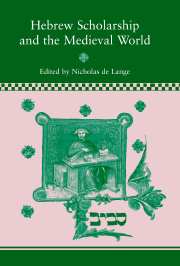Book contents
- Frontmatter
- Contents
- The contributors
- Preface
- List of abbreviations
- PART ONE NEW LINES OF INVESTIGATION
- PART TWO THE HEBREW LANGUAGE
- PART THREE PRAYER AND POETRY
- 8 The origin of the Qaddish
- 9 The journey inward: Yehuda Halevi between Christians and Muslims in Spain, Egypt and Palestine
- 10 Abraham ibn Ezra as a harbinger of changes in secular Hebrew poetry
- 11 O Seville! Ah Castile! Spanish Hebrew dirges from the fifteenth century
- 12 On translating medieval Hebrew poetry
- PART FOUR THE WORLD OUTSIDE
- Bibliography of the writings of Raphael Loewe
- Index of names
12 - On translating medieval Hebrew poetry
Published online by Cambridge University Press: 21 January 2010
- Frontmatter
- Contents
- The contributors
- Preface
- List of abbreviations
- PART ONE NEW LINES OF INVESTIGATION
- PART TWO THE HEBREW LANGUAGE
- PART THREE PRAYER AND POETRY
- 8 The origin of the Qaddish
- 9 The journey inward: Yehuda Halevi between Christians and Muslims in Spain, Egypt and Palestine
- 10 Abraham ibn Ezra as a harbinger of changes in secular Hebrew poetry
- 11 O Seville! Ah Castile! Spanish Hebrew dirges from the fifteenth century
- 12 On translating medieval Hebrew poetry
- PART FOUR THE WORLD OUTSIDE
- Bibliography of the writings of Raphael Loewe
- Index of names
Summary
The challenges of transposing medieval Hebrew poetry into English are formidable. The poems are artefacts of a culturally remote world, governed by aesthetic ideals whose formalism and classicism are alien to contemporary readers. This virtuosic verse fuses traditional Jewish piety and learning with aristocratic worldliness. Even in their synagogue poetry the Andalusians adapted and naturalized the formal and thematic innovations of their urbane, arabicizing non-liturgical verse. Whether devotional or convivial, ascetic or erotic, their poetry is written in pure biblical Hebrew, and is saturated with biblical allusions whose significance is often lost on modern audiences, while its prosody is borrowed from Arabic poetry, yielding quantitative meters, fixed rhyme schemes and enormously clever word-plays that are impossible to replicate in English. Fortunately, however, the aesthetic appeal and historical importance of this corpus have compelled some gifted translators to surmount these obstacles.
Until roughly two decades ago, the only available facing-page anthologies of Andalusian Hebrew poetry were the three volumes in the Schiff Library of Jewish Classics. Two of the volumes were translated by Anglo-Jewish literary figures active at the turn of the century, Israel Zangwill and Nina Salaman (née Davis). The third was translated by Solomon Solis-Cohen, a Philadelphia-born physician and Hebrew scholar of Sephardic descent, who was among the founders of the Jewish Publication Society.
An eminent author and irrepressible wit, Zangwill took a true Victorian approach to Solomon ibn Gabirol's poetry. He saw something ‘almost Swinburnian in his technical mastery, in his power of dancing in fetters’, and opted for verse translations with ‘English measures appropriate to [the poet's] theme’ to achieve an effect analogous to Ibn Gabirol's Hebrew rhymes and meters.
- Type
- Chapter
- Information
- Hebrew Scholarship and the Medieval World , pp. 171 - 186Publisher: Cambridge University PressPrint publication year: 2001
- 1
- Cited by



